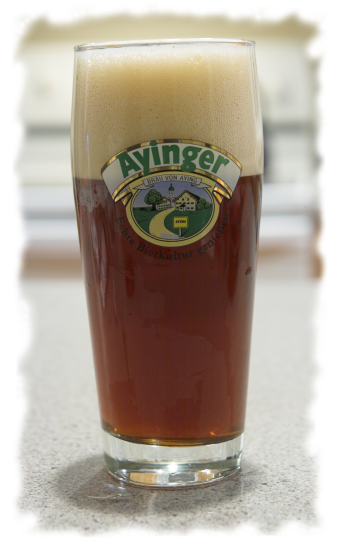Difference between revisions of "Dunkel"
(→Mash) |
|||
| (4 intermediate revisions by the same user not shown) | |||
| Line 1: | Line 1: | ||
[[Image:Dunkel_I.png|center]] | [[Image:Dunkel_I.png|center]] | ||
| − | This is almost as simple as it gets for a Dunkel. | + | This is almost as simple as it gets for a Dunkel. After listening to the Jamil show, I noticed that we even came up with the same grist composition. |
| + | |||
| + | = Water = | ||
| + | ''for brewers who build their own water'' | ||
| + | |||
| + | 30L (assuming 25L (6.25 gal) pre-boil volume) reverse osmosis water + | ||
| + | |||
| + | 0.8g NaCl (table salt) | ||
| + | |||
| + | 0.6g MgSO4 (epsom salt) | ||
| + | |||
| + | 1.8g NaHCO3 (baking soda) | ||
| + | |||
| + | 4.0g CaCO3 (chalk) | ||
| + | |||
| + | |||
| + | (58mg/L Ca; 3mg/L Mg; 32mg/L Na; 10mg/L SO4; 21mg/L Cl; 150mg/L HCO3) | ||
| + | |||
| + | = Grist = | ||
| + | |||
| + | 99% Weyermann Munich Type II | ||
| + | |||
| + | 1% Wyermann Carafa II special | ||
| + | |||
| + | |||
| + | Aim for a post boil gravity of 12.5 *P (1.048 SG) | ||
| + | |||
| + | =Hops= | ||
| + | |||
| + | German Tettnanger Hops to get to 20 IBU (Tinseth) after a 60 min boil time. Substitution with German Magnum or Hallertauer possible. | ||
| + | |||
| + | =Yeast= | ||
| + | |||
| + | Wyeast 2206 Bavarian Lager, propagated to yield about 80 ml (~2.5 oz) for a 19 L (5 gal) batch. | ||
| + | |||
| + | =Mash= | ||
| + | |||
| + | Two step infusion with decoction mash-out ([[Decoction_Mashing]]): | ||
| + | |||
| + | protein rest : 55 *C (133 *F) for 20 min | ||
| + | |||
| + | saccrification rest : 66.5 *C (152 *F) for 45 min; water/grist ratio 3.0 - 3.5 l/kg (1.5 - 1.75 qt/lb) | ||
| + | |||
| + | |||
| + | mash-out : 76 *C (169 *F) | ||
| + | |||
| + | This is a fairly thin mash, but the water/girst ratio use is fairly standard in German brewing practice. | ||
| + | |||
| + | =Boil= | ||
| + | |||
| + | Add hops after 10 min boil and boil for another 60 min. Chill to pitching temperature of 8 *C (46 *F). | ||
| + | |||
| + | =Primary fermentation= | ||
| + | |||
| + | Ferment at 8 - 9 *C (46 - 48 *F) until the attenuation is within 2-4 % of the limit of attenuation (fast ferment test) or appears to be complete. | ||
| + | |||
| + | =Aging/Lagering= | ||
| + | |||
| + | Lager at 0 - 3 *C (32 - 38 *F) for 4 - 8 weeks | ||
| + | |||
| + | =stats= | ||
| + | |||
| + | * Orignal Extract = 12.5 Plato | ||
| + | * IBU (Tinseth) = 20 | ||
| + | * limit of attenuation = 80% | ||
| + | * Final Extract = 3.0 Plato | ||
| + | * limit of attenuation to attenuation difference = 4% | ||
Latest revision as of 21:05, 1 May 2008
This is almost as simple as it gets for a Dunkel. After listening to the Jamil show, I noticed that we even came up with the same grist composition.
Contents
[hide]Water
for brewers who build their own water
30L (assuming 25L (6.25 gal) pre-boil volume) reverse osmosis water +
0.8g NaCl (table salt)
0.6g MgSO4 (epsom salt)
1.8g NaHCO3 (baking soda)
4.0g CaCO3 (chalk)
(58mg/L Ca; 3mg/L Mg; 32mg/L Na; 10mg/L SO4; 21mg/L Cl; 150mg/L HCO3)
Grist
99% Weyermann Munich Type II
1% Wyermann Carafa II special
Aim for a post boil gravity of 12.5 *P (1.048 SG)
Hops
German Tettnanger Hops to get to 20 IBU (Tinseth) after a 60 min boil time. Substitution with German Magnum or Hallertauer possible.
Yeast
Wyeast 2206 Bavarian Lager, propagated to yield about 80 ml (~2.5 oz) for a 19 L (5 gal) batch.
Mash
Two step infusion with decoction mash-out (Decoction_Mashing):
protein rest : 55 *C (133 *F) for 20 min
saccrification rest : 66.5 *C (152 *F) for 45 min; water/grist ratio 3.0 - 3.5 l/kg (1.5 - 1.75 qt/lb)
mash-out : 76 *C (169 *F)
This is a fairly thin mash, but the water/girst ratio use is fairly standard in German brewing practice.
Boil
Add hops after 10 min boil and boil for another 60 min. Chill to pitching temperature of 8 *C (46 *F).
Primary fermentation
Ferment at 8 - 9 *C (46 - 48 *F) until the attenuation is within 2-4 % of the limit of attenuation (fast ferment test) or appears to be complete.
Aging/Lagering
Lager at 0 - 3 *C (32 - 38 *F) for 4 - 8 weeks
stats
- Orignal Extract = 12.5 Plato
- IBU (Tinseth) = 20
- limit of attenuation = 80%
- Final Extract = 3.0 Plato
- limit of attenuation to attenuation difference = 4%


